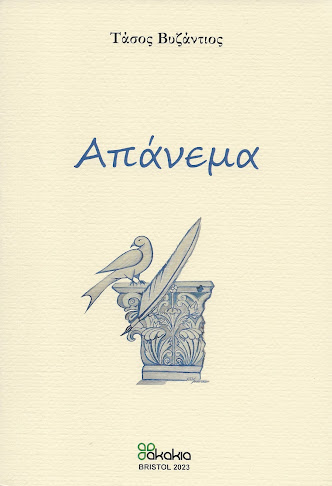skip to main |
skip to sidebar
Ritsos in London
The Anglo-Hellenic League and
Kings College London (KCL) hosted an event on 12 June to mark the publication
of two new books about Yiannis Ritsos and to remember Edmund ‘Mike’ Keeley, who
died last year, and who is regarded by many as the foremost translator of
modern Greek poetry. In many translations he co-operated with the Orthodox
writer and scholar, Philip Sherrard.
Yiannis Ritsos (1909-1990) was
a most prolific poet who, it was said, published over a thousand pages of
poetry. He was nominated nine times for the Nobel Literature Prize but was
never awarded it. John Kittmer, who is a former British Ambassador to Greece and the
President of the Anglo-Hellenic League, gave an overview of Ritsos’s life and
poetry. He has as written a biography of Ritsos that is due to be published next year.
The two books in question are:
‘A Broken Man in Flower’ by David
Harsent, a
very fine poet and winner of many awards including the Forward Prize. This
collection is ‘versions’ of, rather than a ‘translation’ of, the poetry
Ritsos wrote in the Junta years while imprisoned or under house-detention on
Samos. Harsent does not speak Greek but clearly has a great sense of Ritsos’s
work. The collection includes the series of poems, each
four lines long, 18 Λιανοτράγουδα Της Πικρής Πατρίδας (previously published
in a pamphlet as ‘Homeland: 18 Bitter Songs’) which Ritsos wrote at the
request of Mikis Theodorakis.
‘Monochords’
by Chiara Ambrosia who is an Italian film-maker and artist. ‘Monochords’
was a series of very short poems written by Ritsos in 1979, most are one or two
lines long and were written at a rate of about ten a day. Ambrosia has created
a series of 336 black and white images – linocuts – each representing one of
the poems. She created one image each day during lock-down. The poems are
translated by Paul Merchant.
David Harsent gave a powerful reading of poems from ‘A Broken Man in
Flower’ and Chiara Ambrosia showed some thirty of the images on screen and
voiced the translations. There followed a panel discussion which addressed
questions such as
-
how important was it to Ritsos’s poetry that he was
himself also a visual artist?
-
how integral was Ritsos’s politics to his poetry?
-
how important is it that Ritsos was Greek?
As a young man Ritsos was
prolific; as he got older his poems tended to get shorter. It was suggested
this reflected the shrinking of his world while in detention and the physical
shrinking of his body with age. During lockdown, our lives similarly shrunk and
we were less physically active. What Ritsos’s short poems achieve is an
intensity of feeling that leaves the reader having to work harder; many will
consider the effort worth it.
David Harsent: A Broken Man
in Flower - Bloodaxe Books
Homeland: 18 Bitter Songs - Rack Press (out
of print)
Chiara
Ambrosia: Monochords - prototype
Richard Devereux














































No comments:
Post a Comment